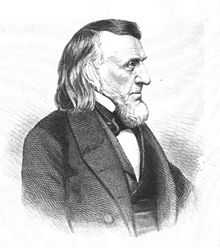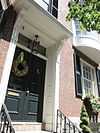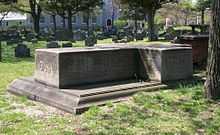Richard Henry Dana, Sr.
| Richard Henry Dana, Sr. | |
|---|---|
 | |
|
| |
| Signature |
|
Richard Henry Dana, Sr. (November 15, 1787 – February 2, 1879) was an American poet, critic and lawyer. His son, Richard Henry Dana, Jr., also became a lawyer and author.
Biography
Richard Henry Dana was born in Cambridge, Massachusetts on November 15, 1787, the son of Federalist judge Francis Dana.[1] He graduated from Harvard College and became a lawyer. He married Ruth Charlotte Smith and they had four children including Richard Henry Dana, Jr.

Dana was also a literary critic. Between 1817 and 1827, he was the first American to write major critiques of Romanticism, though his views were unconventional then.[2] In a review of the poetry of Washington Allston, he noted his belief that poetry was the highest form of art, though it should be simple and must avoid didacticism.[3] Some of his criticisms were controversial. Dana accused Harvard of smothering genius, and that the minds of poets were more insightful than the general community.[1] Dana also criticized the Transcendentalism movement. He wrote, "Emerson & the other Spiritualists, or Supernaturalists, or whatever they are called, or may be pleased to call themselves... [have] madness in their hearts".[2] Dana was a member of the Anthology Club; he and others in the club founded the North American Review.[4][5] in 1817 as an outlet for his criticism, though his opposition with standard conventions lost him his editorial control of it.[6] By 1850, his opinions were widely followed. As he wrote at the time, "Much that was once held to be presumptuous novelty... [became] little better than commonplace".[2]
As a writer of fiction, Dana was an early practitioner of Gothic literature, particularly with his novel Paul Felton (1822), a tale of madness and murder.[7] The novel has also been called a pioneering work of psychological realism alongside works by William Gilmore Simms.[8] Nevertheless, Dana had difficulty supporting his family through his writing, which earned him only $400 over 30 years.[9] In 1849, he was elected into the National Academy of Design as an Honorary Academician.
He lived on Chestnut Street in Boston's Beacon Hill neighborhood, ca.1840s-1870s.[10]

Dana died on February 2, 1879, and was buried in the family plot at the Old Burying Ground next to the First Parish in Cambridge.
Further reading
Works by Dana
- An oration, delivered before the Washington benevolent society at Cambridge, July 4, 1814. Printed by Hilliard and Metcalf, 1814.
- The Idle Man. v.1 (1821-1822)
Works about Dana
- Hunter, Dorren M. Richard Henry Dana, Sr. Twayne Publishers, Inc., 1987.
References
- ↑ 1.0 1.1 Haralson, Eric L. Encyclopedia of American Poetry: The Nineteenth Century. Chicago: Fitzroy Dearborn Publishers, 1998: 115. ISBN 1-57958-008-4
- ↑ 2.0 2.1 2.2 Ferguson, Robert A. Law and Letters in American Culture. Cambridge, MA: Harvard University Press, 1984: 249. ISBN 0-674-51465-3
- ↑ Ferguson, Robert A. Law and Letters in American Culture. Cambridge, MA: Harvard University Press, 1984: 250. ISBN 0-674-51465-3
- ↑ Brickhouse, Amanda. Transamerican Literary Relations and Nineteenth-Century Public Sphere. New York: Cambridge University Press, 2004: 151. ISBN 0-521-84172-0
- ↑ Encyclopædia Britannica, 11th ed. 1910
- ↑ Haralson, Eric L. Encyclopedia of American Poetry: The Nineteenth Century. Chicago: Fitzroy Dearborn Publishers, 1998: 115–116. ISBN 1-57958-008-4
- ↑ Ferguson, Robert A. Law and Letters in American Culture. Cambridge, MA: Harvard University Press, 1984: 252. ISBN 0-674-51465-3
- ↑ Pfister, Joel. The Production of Personal Life: Class, Gender, and the Psychological in Hawthorne's Fiction. Palo Alto, CA: Stanford University Press, 1991: 52–53. ISBN 0-8047-1948-9
- ↑ Sullivan, Wilson. New England Men of Letters. New York: The Macmillan Company, 1972: 99. ISBN 0-02-788680-8
- ↑ Boston Directory. 1848, 1852, 1861, 1873
External links
| Wikisource has original works written by or about: Richard Henry Dana, Sr. |
| Wikimedia Commons has media related to Richard Henry Dana. |
- WorldCat
- Richard Henry Dana, Sr. at Lawyers and Poetry
|